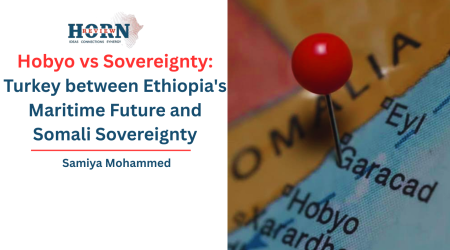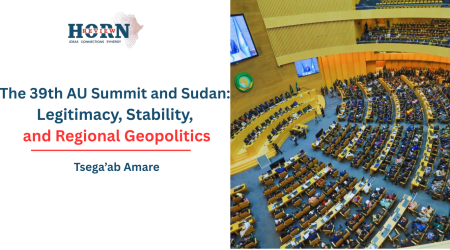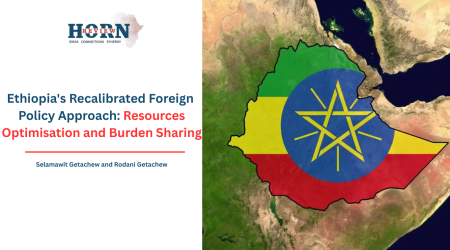
9
Jul
Strategic Autonomy: Ethiopia’s Digital Frontier and the Horn of Africa’s Security Landscape
In an increasingly networked yet more volatile world, the quest for strategic autonomy has become a defining characteristic of national security policies. For Ethiopia, a geopolitically crucial country in the Horn of Africa, this necessity stretches deep into the virtual world. The new initiative by Ethiopia’s Information Network Security Agency (INSA) to introduce local applications like Ergamail, Serkuni, and Debo in government offices, replacing foreign platforms for messaging and email, is a major step towards improving cybersecurity and digital independence. The move is consistent with Ethiopia’s overall “Digital Ethiopia 2025” vision that promotes digital autonomy (FDRE ,2025).
Essentially, strategic autonomy in cyber security means the capacity of a country to act freely within the cyber space without being inappropriately influenced or reliant on external technological influences. The rationale behind Ethiopia’s move is multi-faceted and addresses an essential security requirement. International cyber platforms, as convenient as they are, have inherent vulnerabilities and expose sensitive government messages and information to potential espionage, surveillance, or sabotage from state and non-state actors.
The specter of cyber warfare, exemplified by nations like North Korea which has leveraged sophisticated cyber capabilities for both strategic disruption and illicit financial gain(Yong.L,Hyun-uk.H,2025) the existential danger of digital compromise. Similarly, nations like China and Russia have strongly developed their own digital ecosystems and sovereign internet infrastructures to promote national security and control information flow, and India’s “Digital India” initiative promotes indigenous solutions and data localization to achieve digital sovereignty and an indigenous technology industry. In Ethiopia, a nation with complex domestic and external security challenges, protecting its digital infrastructure is not an IT issue but a fundamental aspect of national defense. This forceful strategy is also an economic policy.
Reliance on foreign software and cloud services has a huge capital loss through license, subscription, and maintenance fees. This recurring expenditure not only empties national treasuries but also stifles the development of a robust domestic tech industry. By investing in the country, such as INSA has done with Ergamail (e-mail), Serkuni (messaging), and Debo (services), Ethiopia is striving to build local competences, create quality employment, and retain capital within the economy. That makes the economy more resistant and less reliant on overseas suppliers and less exposed to supply chain cut-offs or politically motivated withdrawal of services.
While the initial cost can be expensive, the long-term benefit of reduced foreign exchange outlay and expanding domestic digital economy can operate to more than balance them, leading to an overall decrease in “income leakage” to foreign tech firms. Digital sovereignty is really about control, with a nation exercising ultimate control over its data, its digital policy, and the application of national law within its digital borders. This is particularly vital to critical national infrastructure and government process, where data confidentiality and integrity are of paramount importance.
INSA’s roll-out of these bespoke applications is a tangible testament to Ethiopia’s commitment to its Digital Transformation Strategy, which professes digitally independent generic holes in practice, if not in name. Ergamail, Serkuni, and Debo are built to provide secure, localized alternatives, such that government communications and services pass through infrastructure entirely within the control and audit of national institutions. This is a response to concerns about data residency, compliance with national privacy legislation, and rapid response to cyber attacks without reliance on external help or permissions.
The repercussions of Ethiopia’s proactive move extend beyond its borders, resonating across the Horn of Africa. The region, owing to its strategic location, driving digital surge, and endemic security problems,stands out as most receptive to similar initiatives.Ethiopia’s success or struggle with embracing this strategic independence would be an important case study. Other nations within the region, threatened and dependent similarly, might find incentive to take a path of their own towards digital independence. This could potentially seed a regional movement towards indigenous digital capacity building, strengthening overall digital security.
But this pursuit of national digital sovereignty must be handled extremely delicately along with the need for regional cybersecurity cooperation. As states harden their borders, cyber threats are international in scope. Shared intelligence, regional cyberattack response cooperation, and unified legal frameworks for cybercrime remain imperative. Ethiopia’s initiative could, in contrast, result in more robust regional collaboration as nations with more robust, independent digital pillars are able to contribute more effectively to collective security efforts.
The path to achieving digital autonomy is not without challenges. The technical challenges are to make homegrown applications scale, be interoperable, and receive frequent security upgrades. User acceptance and training will be key, as will an agency cybersecurity literacy culture. Most challenging of all can be human capital capacity building creating a sufficient talent pool of cybersecurity specialists, software developers, and digital infrastructure professionals. Ethiopia’s aggressive embrace of digital independence, represented by INSA’s homegrown apps, is an act of visionary leadership towards national security and economic advancement.
By reducing reliance on overseas sites, Ethiopia is not only building its bulwark against a more varied array of cyberattacks but also laying the groundwork for a more resilient and independent digital economy. While this journey is also filled with its own pitfalls, such a bold move presents a lesson to the entire Horn of Africa about how countries must assert their digital sovereignty in a world where national power becomes increasingly linked with digital command. The ultimate success hinges on sustained investment, robust policy regimes, and a will to develop indigenous capability, whereby the digital future of Ethiopia is assured and owned by itself.
It is not just a technological transformation for Ethiopia; it’s an independence declaration in the 21st century. And with the Horn of Africa occupying the strategic intersection of global power and digital change, Ethiopia’s emphasis on local solutions is a shining light. It is not merely a matter of national interest that this aggressive push for digital sovereignty is all about; it’s about charting the path to a new world in which the region’s digital destiny is in its own hands, in which security, prosperity, and self-determination are forged there.
By Bethelhem Fikru,Researcher,Horn Review
Reference
1.FDRE (2025).Digital Ethiopia 2025 Digital Strategy for Inclusive Prosperity in Ethiopia. P.P:9,FDRE.https://digitalfinance.shega.co/resource/policy-and-regulations/digital-ethiopia-2025-digital-strategy-for-inclusive-prosperity-in-ethiopia
2.Yong.L,Hyun-uk.H(2025).Digital warfare: N.Korea’s evolving cyber arsenal and global threats,Daily N.K










